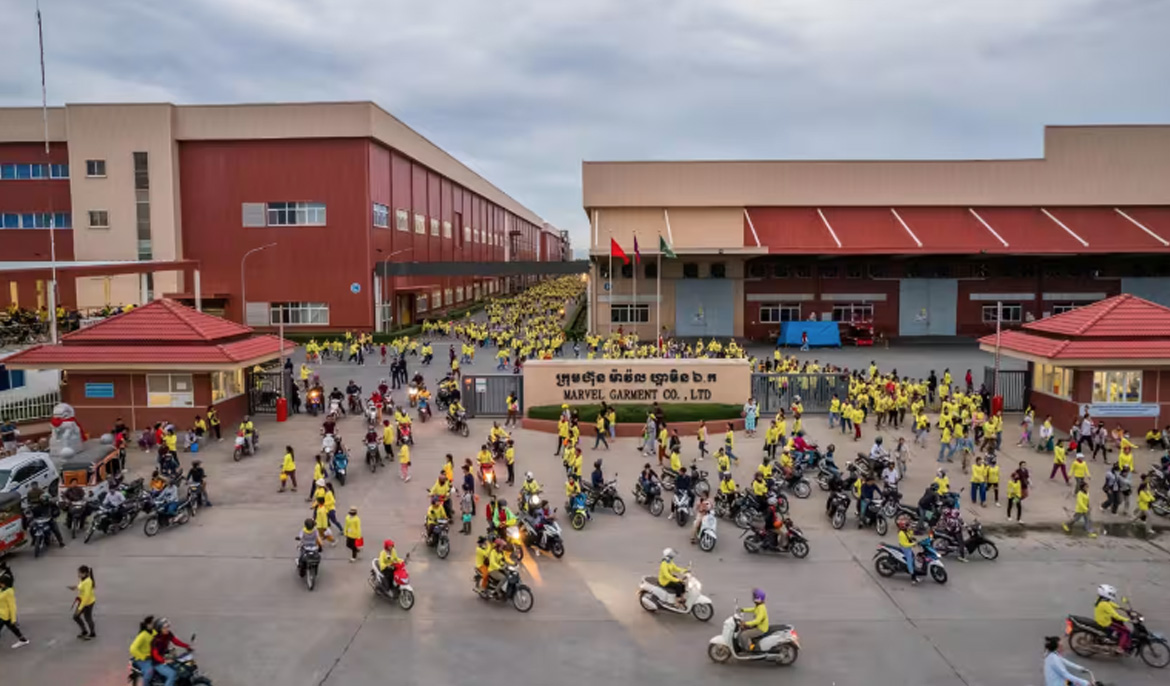TOKYO — A Cambodian industrial park that has long served as a base for Japanese and Chinese manufacturers is looking to diversify as shifts in global supply chains create opportunities for the Southeast Asian country to attract more companies.
The Phnom Penh Special Economic Zone in the capital houses more than 90 tenants from 15 countries in an area of 3.57 square kilometers. It is one of Cambodia’s leading industrial parks, along with a 10-sq.-km Chinese industrial park in Sihanoukville.
Currently, Japanese and Chinese companies account for two-thirds of its tenants. The two economies remain important for the industrial park as sources of investment, but the operator says it aims to attract more Thai and Vietnamese companies, as well as global companies moving their bases from the two neighbors.
“Geographically, it is easy to complement Thailand’s supply chain, and we have been trying to attract companies to PPSEZ with the ‘Thailand plus one’ sales pitch,” Hiroshi Uematsu, the chief executive of the operator Royal Group PPSEZ, told Nikkei Asia in an online interview, referring to a movement in which companies in Thailand also set up new bases in neighboring countries due to rising costs in Thailand.
The PPSEZ is 540 km from Bangkok, about 10 hours by truck.

Cambodian Foreign Minister Sok Chenda and Thai Foreign Minister Maris Sangiampongsa met in Phnom Penh on June 28 and discussed that establishing mutual special economic zones in border provinces would “enhance supply-chain connectivity and create economic synergies,” according to the Cambodian authority.
Phnom Penh is about 200 km away from Ho Chi Minh City and the southern Vietnamese province of Dong Nai, which hosts many industrial parks. “We believe it is possible to encourage production transfer from Vietnam and build a cooperative supply chain,” Uematsu said.
Uematsu said Cambodia will draw more companies as companies reconfigure their supply chains due to geopolitical changes. “If Donald Trump wins the November U.S. presidential election, trade conflicts between the U.S. and China may escalate, and Cambodia will attract even more attention as a production relocation destination,” he said.
“Although Western countries have been criticizing Cambodia for its dictatorship, Cambodia is in a way (politically) stable,” Uematsu added.

Launched in 2006, the PPSEZ has been a key driver for the Cambodian economy. Japanese electronics component maker MinebeaMitsumi had been the biggest tenant for a long time, manufacturing bearing and motor products.
That position has been taken over by a Chinese company as Beijing’s economic clout in Cambodia increases. “China’s Marvel Garment, which began operations in 2020, is now the PPSEZ’s largest company in three aspects: It has 50 hectares, employs 17,000 workers and [has the highest] export value [among the tenants]. It represents the change of PPSEZ,” Uematsu said, adding that the company produces products for Nike, Polo and others on contract and exports mainly to the U.S.
Japan is one of the countries that Cambodia wants to attract investment from. Cambodian Deputy Prime Minister Sun Chanthol said in a May interview in Tokyo that Japanese investment would help curb Cambodia’s overall economic dependence on China. But Uematsu said in the interview that the weak yen against the dollar has made it difficult for Japanese companies to enter Cambodia, a dollar-dependent economy.
 MinebeaMitsumi’s plant in the zone. (MinebeaMitsumi)
MinebeaMitsumi’s plant in the zone. (MinebeaMitsumi)
As the PPSEZ seeks more business relocations from its neighbors, Uematsu said Cambodia’s relatively high logistics costs need to be addressed. He said businesses in Thailand allege that Cambodian customs officers ask them for bribes, whereas customs officers say logistics companies are ripping them off.
“We wanted to clarify these opaque costs, so we began assigning five specialized personnel certified as customs brokers in May 2023,” he said. “In some cases, this can reduce logistics costs in Cambodia by less than half. If corruptions are eliminated by fully digitalizing customs procedures, I believe it is possible to lower down total logistics cost [from neighboring countries] up to 30%.”
Uematsu said the Cambodian government is very attentive to the voices of foreign investors. One official told him that Prime Minister Hun Manet had instructed ministries and agencies to “address the problems of businesses because the private sector will boost the economy.”


